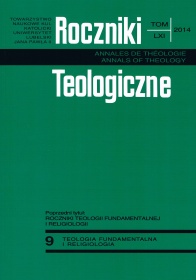The Relationship Between Faith, Reason, and Science in the Transmission of the Faith in the Times of Growing Secularization
Abstract
This article touches mostly on two points: the relationship between faith, reason, and science (1) and John Paul II's explanation of the growth of secularization (2) asavery important context of the transmission of the Christian faith today.
1. Faith and reason need each other and support each other. Christian faith is not a natural product of human reason and always provokes reason to open itself and to see much more than reason alone can see.
Genuine science is not in conflict with Catholic Christianity. Science, which came to exist thanks to Judeo-Christian Revelation, is a different order of knowledge that has its own built-in logic and dignity. Science wants to know better the material side of nature, while faith is apersonal and active answer to God's Revelation which was fulfilled in Jesus Christ. Its credibility has many reasons. Some of them are confirmed by scientists investigating nature but more of them are the subject of Fundamental Theology which is a successor of Apologetics.
The Catholic Church owes very much to science and scientists and honors their genius. Good science makes many peoples' lives better: medical care, the production of more food, the confirmation of the authenticity of The Shroud of Turin, the confirmation of medical miracles are all products of good science.
2. John Paul II was aware of a phenomenon of growing secularization, especially in the western world. He knew that this phenomenon is explained by some people as proof of the fact that Christian faith is going to end. According to him, secularization seems to grow only in the western world and is a proof of its cultural and ethical crisis. This is the crisis of man, of vision, and the vocation of men. This culture needs repairs, needs a new spirit, a new certain hope to be able to survive. It might be given by the Christian faith which offers a full meaning of human life and answers all existential questions.
References
Chaberek M.: Kościół a ewolucja [The Church and Evolution]. Warszawa: Fronda 2012.
Johnston G.S.: An Evening with Darwin in New York. “Crisis” 24:2006 no.3 pp. 32-37.
Johnston G.S.: Why Catholics Like Einstein (http://www.crisismagazine.com/1996/why-catholics-like-einstein-3; access on the 3rd of November, 2013).
Johnston G.S.: Did Darwin Get It Right? Catholics and the Theory of Evolution. Our Sunday Visitor. Indiana 1998 [Polish translation: Czy Darwin miał rację? Katolicy a teoria ewolucji, tłum. J. Kaliszczyk. Kraków: Wydawnictwo WAM 2005].
Kaucha K.: Fides et ratio. W: Leksykon Teologii Fundamentalnej [Lexicon of Fundamental Theology], ed. M. Rusecki, K. Kaucha, I. S. Ledwoń, J. Mastej. Lublin−Kraków: Wydawnictwo M 2002 pp. 399-404.
Kaucha K.: Wiarygodność Kościoła w kontekście wyzwań współczesności europejskiej w świetle nauczania Jana Pawła II [The Church's Credibility in the Context of the Challenges faced by Modern Europe in the Light of the Teaching of John Paul II]. Lublin: Wydawnictwo KUL 2008.
Lambert D.: Sciences et théologie. Les figures d'un dialogue. Bruxelles: Éditions Lessius 1999.
Rok wiary – rok odnowy [Year of the Faith – Year of Renewal]. Ed. K. Kaucha, A.Pietrzak, W. Rebeta. Lublin: Wydawnictwo KUL 2013.
Rusecki M.: Wiarygodność chrześcijaństwa. T. 1: Z teorii teologii fundamentalnej [Credibility of Christianity. Vol. 1: From Theory of Fundamental Theology]. Lublin: TN KUL 1994.
Rusecki M.: Traktat o Objawieniu [Treatise on Divine Revelation]. Kraków: Wydawnictwo Księży Sercanów 2007.
Rusecki M.: Traktat o religii [Treatise on Religion]. Warszawa: Verbinum 2007.
Rusecki M.: Traktat o wiarygodności chrześcijaństwa. Dlaczego wierzyć Chrystusowi? [Treatise on Credibility of Christianity. Why should one believe Christ?]. Lublin: TN KUL 2010.
Serio G.: Scienza e religione. Un dialogo possibile. Roma: Armando Editore 2013.
Copyright (c) 2014 Roczniki Teologiczne

This work is licensed under a Creative Commons Attribution-NonCommercial-NoDerivatives 4.0 International License.





